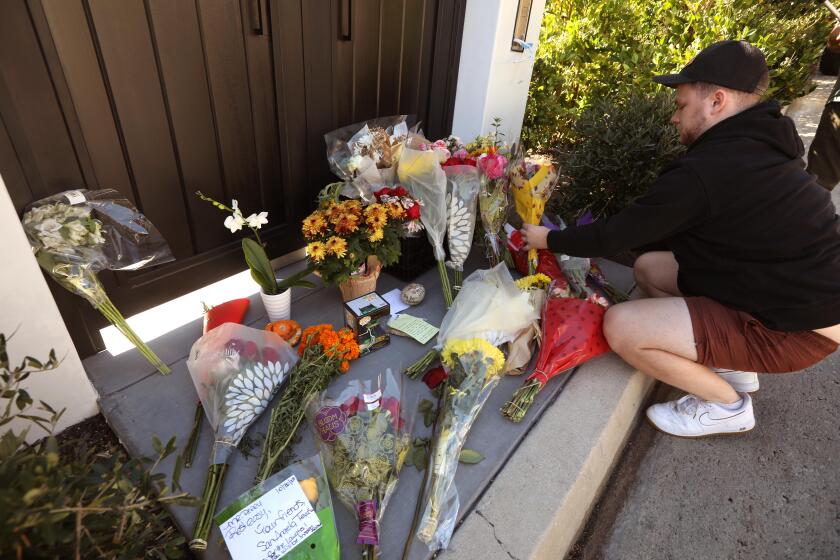Inside the investigation that will determine how Matthew Perry died

Hours before actor Matthew Perry died at his Pacific Palisades homes Saturday, he had played pickleball.
He returned home, law enforcement sources said, and at some point got into his hot tub. It was there that an assistant found him unresponsive and called 911 around 4 p.m.
In trying to determine the cause of death of the “Friends” star, authorities have been retracing his steps that day. But experts say the ultimate answer will probably come from a team of physicians and investigators working out of the L.A. County coroner’s office on North Mission Road in Boyle Heights.
Extensive work ahead
Experts said the team’s work will be extensive and likely take a couple of months to complete. In addition to examining the body, they also will conduct toxicology tests, interview those who were around Perry that day and scour the scene for clues.
No cause of death has been determined. The Los Angeles County coroner’s office has launched an investigation, which will likely take months and include toxicology tests.
The identity of the caller who found Perry at his home overlooking the Pacific Ocean has not been revealed.
“Even the temperature of the Jacuzzi will be taken,” said Craig Harvey, a retired L.A. County chief of coroner’s investigations. “We do everything you see on TV, but it takes time.”
Law enforcement sources told The Times that no illicit drugs were found at the home.
Los Angeles Police Capt. Scot Williams, who leads the Robbery-Homicide Division that is investigating Perry’s death, said Sunday that the “cause of death may not be known for some time, but at this point, foul play is not suspected.”
Matthew Perry was found dead at his Los Angeles home on Oct. 28. ‘Friends’ stars and others shared tributes to the actor.
Harvey said that while an autopsy may have answered a lot of fundamental questions about the state of Perry’s body, including his heart, arteries and lungs, a more detailed examination conducted by a toxicologist and looking for chemicals in his organs may tell another story.
“The autopsy will reveal any cardiac issues. With the naked eye they will [be] able to look at his heart and see if any of his arteries are clogging,” Harvey said.
Officials with the coroner’s office note that toxicology testing can take three to six months.
“Postmortem toxicology testing is a multistep process, not a one-instrument test as seen in the clinical setting,” the office said in a statement. “Postmortem samples are coagulated and require extraction steps before a sample can be used on an instrument.”
Coroner’s officials say that each class of drugs requires multiple instruments to test a sample and noted that “the more drugs found in a decedent’s system, the longer the testing takes.”
Authorities found Perry unresponsive in his Los Angeles home Saturday. There was no sign of foul play.
One law enforcement source who spoke on condition of anonymity because the investigation is ongoing said any prescription medications recovered at the home will be part of the review, which is common practice.
The sources said that although Perry was found in the hot tub, no determination has been made as to whether he drowned.
Health issues will be examined
Michael Baden, New York City‘s former medical examiner, said that in Perry’s case, “at the autopsy, they should know whether he was alive when he went into the water, judging from the amount of water in his lungs.”

Baden said the medical examiner would also measure the size of the heart and look for signs of coronary artery disease as well as a stroke with cerebral artery disease and cerebral hemorrhaging.
Perry had publicly revealed in his autobiography “Friends, Lovers and the Big Terrible Thing” that he had a gastrointestinal perforation, and that could have led to long-term complications, Baden said. The medical examiner also may conduct a microscopic examination of the heart tissue, he added.
HBO’s Max added a tribute to actor Matthew Perry after he died Saturday. It is now displayed at the beginning of each ‘Friends’ season.
Given Perry’s history of drug use, Baden said investigators also would explore that angle.
Harvey said toxicology tests involve collecting specimens from organs and then testing them for various narcotics and medications.

Harvey said that if drugs are found, their use could be considered an overdose, accidental overdose, therapeutic or insignificant, depending on the amount. Harvey said the toxicology tests take time and are repeated.
“We err on the side of caution,” he said.
The L.A. coroner’s office has extensive experience in high-profile cases, having investigated the deaths of silver screen legend Natalie Wood, hip-hop stars Notorious B.I.G. and Nipsey Hussle and pop icon Michael Jackson.
More to Read
Sign up for Essential California
The most important California stories and recommendations in your inbox every morning.
You may occasionally receive promotional content from the Los Angeles Times.














